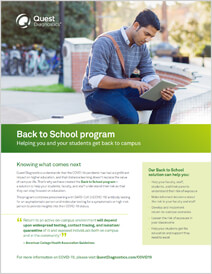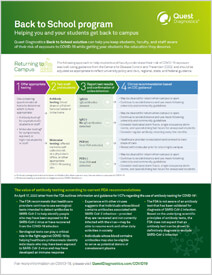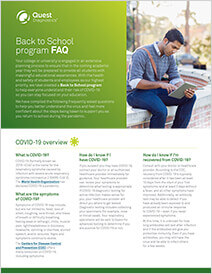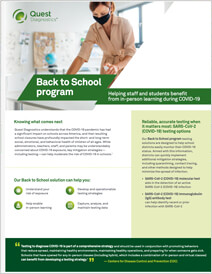
Let our knowledge lead the way
Back to School with our COVID-19 testing programs

Testing solutions to help you and your students on campus
As colleges and universities welcome students back to campus at the start of the new semester, there are understandable concerns about health and safety during the ongoing pandemic.
That’s why we’re offering our Back to School program–a solution that helps your students, faculty, and staff understand their risk so they can stay focused on education.
The program combines 3 types of screening tests to provide insight into SARS-CoV-2 (COVID-19) infection status. IgG antibody tests are a prescreen for those without symptoms. Molecular active infection tests detect or confirm the presence of the virus in symptomatic or high-risk individuals. And a combination test helps distinguish between COVID-19 and influenza.
We customize our program to meet your unique needs and provide additional support for continued testing throughout the school year.
Get Started
Fill out the form below to be contacted by one of our representatives and learn how we can work together to help your students and faculty.
Please note: This form is intended for university administrators and staff. If you are a student, please contact your university to learn more about the testing opportunities available to you.
*indicates a required field
Quest’s size and experience allow us to lead the way in COVID-19 testing
Scalable to meet your needs:
Returning to campus
Test students, faculty, and staff for SARS-CoV-2 IgG antibodies and active infection.
Staying on campus
Monitor for symptoms, distinguish between COVID-19 and flu, provide ongoing testing, and isolate any active cases on campus.
Coming back from break
Rescreen prior to returning from breaks by providing IgG antibody or molecular testing to qualifying students, faculty, and staff.
Flexible to give you options:
At school
Make ongoing IgG antibody and molecular tests, plus flu tests and temperature checks available for students, faculty, and staff.
At Quest
IgG antibody testing is available at our nationwide network of over 2,200 Patient Service Centers.
At home
Molecular active infection tests are offered via self-collection kits and can be observed by a telehealth provider as needed.
Intervention at key touchpoints:

Surveillance
Deploy testing for students at regular intervals and athletes ahead of training and events.

Diagnostic
Test symptomatic students with molecular active infection testing or the COVID-19 + flu panel.

Outbreak
Manage infection outbreaks of COVID-19 or flu to help determine treatment and isolation plans.
FAQ: Common questions from students
COVID-19 overview
Find the right COVID-19 test for you
Returning to campus
Staying on campus
Returning from breaks
COVID-19 overview
What is COVID-19?
COVID-19 (formally known as 2019-nCoV) is the name for the respiratory syndrome caused by infection with severe acute respiratory syndrome coronavirus 2 (SARS-CoV-2). The World Health Organization has declared COVID-19 a pandemic.
What are the symptoms of COVID-19?
Symptoms of COVID-19 may include, but are not limited to, fever, loss of smell, coughing, sore throat, shortness of breath or difficulty breathing, feeling weak or lethargic, chills, muscle pain, lightheadedness or dizziness, headache, vomiting or diarrhea, slurred speech, and/or seizures. Signs and symptoms continue to evolve.
The Centers for Disease Control and Prevention (CDC) offers many resources on COVID-19, including symptoms.
How do I know if I have COVID-19?
If you suspect you may have COVID-19, contact your doctor or an authorized healthcare provider immediately for guidance. Your healthcare provider can review your symptoms to determine what testing is appropriate. If COVID-19 diagnostic testing for active infection makes sense for you, your healthcare provider will direct you where to get tested. Diagnostic testing includes collecting your specimens (for example, nose or throat swab). Your respiratory specimens will be sent to Quest for advanced testing to determine if you are positive for COVID-19 or not.
How do I know if I'm recovered from COVID-19?
You are considered “recovered” from COVID-19 and no longer infectious if it has been at least 10 days from the start of your first symptoms, and at least 24 hours without a fever, and all other symptoms have improved.
Additionally, an antibody test may be able to detect if you have previously had an infection and already recovered—even if you never experienced symptoms. Detecting antibodies indicates you may possibly have a lower risk of getting COVID-19 again. It is not yet known whether recovery from COVID-19 includes any immunity, or protection against getting the infection again, and if there is protection, for how long any possible immune protection may last.
Find the right COVID-19 test for you
Active infection swab test
What is an active infection swab test?
This type of test helps to diagnose whether you currently have an active COVID-19 infection.
A diagnosis can guide you and your doctor or healthcare provider in treatment planning and help you make an informed decision about isolating to protect your family and friends.
Who can get tested?
Active infection testing may be right for you if you are currently experiencing COVID-19 symptoms or were exposed to the virus in the last 14 days. Common COVID-19 symptoms may include, but are not limited to, fever, cough, and shortness of breath.
How does the test work?
Your doctor or healthcare provider will collect a specimen through a nasal or throat swab. The specimen is then sent to Quest laboratories for processing using either our lab-developed test, a Roche-developed test, or a Hologic-developed test.
Where to get tested
Contact your doctor or another authorized healthcare provider for guidance on where in your community to get tested for an active infection. (Do not go to a Quest Patient Service Center for this test.)
Antibody blood test
What is an antibody blood test?
This type of test detects antibodies that show whether you have already recovered from a prior COVID-19 infection— even if you never showed signs of being sick. The presence of antibodies indicates you may possibly have a lower risk of COVID-19 infection. It is not yet known whether recovery from COVID-19 includes any immunity, or protection against getting the infection again, and if there is protection, for how long any possible immune protection may last. Understanding your antibody status and risk level helps you and your doctor or healthcare provider make an informed decision about returning to work or activity.
Who can get tested?
Antibody testing is available only to those who are not currently experiencing COVID-19 symptoms and have not experienced symptoms within 10 days. Common COVID-19 symptoms may include, but are not limited to, fever, cough, and shortness of breath.
How does the test work?
If your doctor or healthcare provider has submitted an order for you to get a COVID-19 antibody test or you purchased one through QuestDirect™, you can make an appointment at a Quest Patient Service Center. You do not need to fast for this test. A phlebotomist will draw your blood, and the specimen is then sent to Quest laboratories for processing.
Where to get tested
You can make an appointment at a Quest Patient Service Center for an antibody test. However, your doctor or healthcare provider must have submitted an order for your test or you must have purchased one through QuestDirect.
Returning to campus
In order to reopen campus, university faculty, students, staff, and attendees at any residential programs will be required to have initial, and potentially ongoing, testing.
What steps do I need to take in order to return to my school campus?
First, you will receive an email with a link to an online questionnaire you must complete to determine which test is the right one for you.
If you are high risk, symptomatic, or have been exposed to SARS-CoV-2 (COVID-19):
You will need a diagnostic test to ensure it is safe for you to return to campus. If you suspect you have COVID-19, contact your doctor or healthcare provider. They will direct you on where to get tested. Quest Diagnostics can also help you access this testing through one of our retail collection sites or via a telehealth provider-supervised, home self-collection kit.
High risk according to the CDC:
Based on what we know now, those at high risk for severe illness from COVID-19 are:
- People 65 years and older
- People who live in a nursing home or long-term care facility
- People of all ages with underlying medical conditions, particularly if not well controlled, including:
- People with chronic lung disease or moderate to severe asthma
- People who have serious heart conditions
- People who are immunocompromised
- Many conditions can cause a person to be immunocompromised, including cancer treatment, smoking, bone marrow or organ transplantation, immune deficiencies, poorly controlled HIV or AIDS, and prolonged use of corticosteroids and other immune-weakening medications
- People with severe obesity (body mass index [BMI] of 40 or higher)
- People with diabetes
- People with chronic kidney disease undergoing dialysis
- People with liver disease
If you are asymptomatic, have not been exposed to COVID-19, and are not considered high risk:
Your college or university may request that you get an antibody test if you are asymptomatic. You can take the antibody test at a Quest Patient Service Center (PSC) by appointment or by scheduling an in-home visit. Please note you must be symptom-free for at least 10 days in order to have COVID-19 immune response testing performed at Quest PSCs. You must have a doctor’s order or order the test through QuestDirect™ to make an appointment for COVID-19 immune response testing. Once the test is ordered, you can make an appointment at a Quest PSC.
How do I find a Patient Service Center?*
You can find the nearest Quest Patient Service Center online. You can also make an appointment and get test results using the MyQuest® online portal. All Quest PSCs have implemented enhanced safety measures through our Peace of Mind program:
- Special hours for vulnerable patients
- Social distancing
- Required masks and PPE for PSC employees
- More frequent cleaning
- Wait by Text program
* Quest Patient Service Centers only offer antibody testing to determine prior exposure. Quest does not offer testing for active infections at Patient Service Centers.
How and when do I get my test results?
If you provide a specimen at a Quest PSC, test results are usually available within 3 days, but turnaround time can vary due to high demand. Typically, the quickest way to get your test results is having them sent to you automatically through the secure MyQuest online portal. If you don’t already have a MyQuest account, signing up is free and easy.
Do I have to pay for this testing?
Quest will bill your college or university directly for the cost of student and faculty COVID-19 testing. If you will be responsible for any of the cost for testing, the University will notify you.
What do I do if I test positive for an active COVID-19 infection?
If you test positive for an active infection (PCR), you should contact your local healthcare provider for guidance. You should not return to campus while you have an active infection.
Staying on campus
Will there be further testing required during the academic year?
Your college or university will carefully monitor the campus population for symptoms and quarantine any active cases. Ongoing testing will be provided as required.
How can I protect myself from contracting COVID-19?
Help protect yourself from COVID-19 with simple prevention methods. The CDC recommends that you:
- Practice social distancing
- Avoid touching your eyes, nose, and mouth
- Stay home when you are sick
- Cover your cough or sneeze with a tissue or your forearm/upper arm
- Clean and disinfect frequently touched surfaces
- Wash your hands often with soap and water
In addition to the precautions you should take to help protect yourself from contracting COVID-19, your college or university may require all students, faculty, and visitors to wear appropriate personal protective equipment (PPE) in any public situation where social distancing is difficult. You should avoid large gatherings and maintain a distance of 6 feet from other people. This reduces the chance of contact with those knowingly or unknowingly carrying the infection.
What is appropriate PPE for on campus?
The CDC recommends use of non-medical, cloth-based face coverings in public settings where social distancing is difficult. Medical masks should be reserved for healthcare workers.
What should I do if I start experiencing symptoms of COVID-19 while on campus?
If you begin to experience symptoms consistent with those of a COVID-19 infection, contact your doctor or an authorized healthcare provider immediately for guidance. Your healthcare provider can review your symptoms to determine what testing is appropriate.
Returning from breaks
Is testing for COVID-19 required when I return from breaks?
Upon return from all school breaks, your college or university may require you to retake the online questionnaire to determine if it is safe for you to return to campus. This link will be emailed to you.
Contact us to begin building your program now
Build Your Program NowImportant information about COVID-19 antibody testing
The test is designed to detect antibodies to SARS-CoV-2, the virus that causes COVID-19. Antibodies are proteins that the body produces in response to infections. The antibodies can be produced even if a person has few or no symptoms during the infection.
It generally takes some time after infection for antibodies to be produced and become detectable in blood (sometimes up to 3 weeks). It is important to remember that we do not yet know whether having antibodies to SARS-CoV-2 will prevent against getting the infection again or if you are totally free of the virus. Antibodies are generally detectable in the blood for a period of time after a person has recovered from the infection and after the virus that caused the infection is no longer detectable by laboratory methods.
Sometimes the antibodies developed in response to an infection protect us from getting that same infection again. But, it is important to know that we do not yet know whether this is true for COVID-19. Even if you have recovered and have antibodies, there is a chance that you still have the virus and you can infect others, it is still critical to keep taking measures to avoid getting infected again and/or spreading infection.
The antibody test is not meant for detecting an active infection. The swab test (sometimes also known as a molecular, RNA or PCR test) should be used to test for active infection.
A negative antibody test result means that antibodies were not detected in your blood sample. This can have several possible meanings. It could mean that:
- You have not been infected with SARS-CoV-2, or
- You have been infected with SARS-CoV-2, but your antibodies have not reached a sufficient level for the test to be able to detect them, or
- You have been infected with SARS-CoV-2, but there has not been enough time for antibodies to develop (it can take up to one to three weeks to develop antibodies after someone is infected, sometimes longer).
A positive antibody test result means that antibodies were detected in your blood sample. This can have a couple of possible meanings. It could mean that:
- You have been infected with SARS-CoV-2 at some point in the past, or
- Uncommonly, you may have developed antibodies from an earlier infection with a different virus related to SARS-CoV-2 and the laboratory test cannot distinguish between these other virus antibodies and those antibodies generated in response to SARS-CoV-2.
COVID-19 testing statements
- The antibody tests have not been FDA cleared or approved;
- The antibody tests have been authorized by FDA under an EUA for use by authorized laboratories;
- The antibody tests have been authorized only for the detection of IgG antibodies against SARS-CoV-2, not for any other viruses or pathogens; and,
- The antibody tests are only authorized for the duration of the declaration that circumstances exist justifying the authorization of emergency use of in vitro diagnostics for detection and/or diagnosis of COVID-19 under Section 564(b)(1) of the Act, 21 U.S.C. § 360bbb-3(b)(1), unless the authorization is terminated or revoked sooner.
- The cobas SARS-CoV-2 & Influenza A/B Test and the Quest SARS-CoV-2 RT-PCR test and other molecular tests (“Tests”) have not been FDA cleared or approved.
- The Tests have been authorized by the FDA under an EUA for use by laboratories certified under the Clinical Laboratory Improvement Amendments of 1988 (CLIA), 42 U.S.C. § 263a, to perform moderate and high complexity tests. The Roche test has been authorized only for the detection of RNA from SARS-CoV-2 virus, Influenza A virus, and Influenza B virus and not any other viruses or pathogens.
- The Roche test is only authorized for the duration of the declaration that circumstances exist justifying the authorized of the emergency use of in vitro diagnostics for detection and differentiation of SARS-CoV-2 virus, Influenza A, and Influenza B under section 564(b)(1) of the Act, 21 U.S.C. § 360bbb- 3(b)(1), unless the authorized is terminated or revoked sooner.
- The Quest test and other molecular tests been authorized only for the detection of nucleic acid from SARSCoV-2, not for any other viruses or pathogens.
- The Quest test and other molecular tests are only authorized for the duration of the declaration that circumstances exist justifying the authorization of emergency use of in vitro diagnostics for detection and/or diagnosis of COVID-19 under Section 564(b)(1) of the Act, 21 U.S.C. § 360bbb-3(b)(1), unless the authorization is terminated or revoked sooner.



